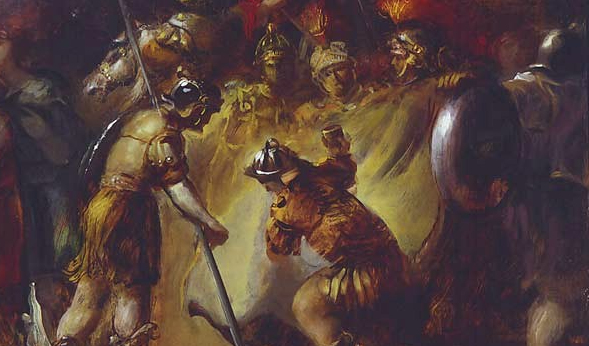“And they crucified him, and parted his garments, casting lots: that it might be fulfilled which was spoken by the prophet, ‘They parted my garments among them, and upon my vesture did they cast lots,’” (Matt. 27:35).
Of all the prophetic passages of Christ’s passion, none so specifically paints the minute details of our Savior’s death as Psalm 22. And verse 18 of this messianic psalm are the very words quoted by Matthew in the verse of this text: “They part my garments among them and cast lots upon my vesture.” This verse refers to a particular incident that occurred at the foot of the cross that Friday afternoon as Jesus hung dying.
Per Jewish custom, our Savior was wearing two garments: the one, a larger outer garment, and the other, a seamless inner tunic (John 19:23). Four Roman soldiers were assigned to attend the crucifixion of Christ, and at the time he was nailed to the cross, he was stripped of his clothing, leaving him hanging in a shameful state of nakedness.
Both Matthew and Luke’s account of Christ’s death simply state that these soldiers divided up what was referred to collectively as “his garments” (likely consisting of a head piece, an outer garment, his girdle, and his sandals). It would seem from John 19:23 that they came to some agreement on who got each item of clothing between them. But there was one more item to be considered, his seamless inner coat or tunic, likely a more valuable piece than the rest. So as John further explains, instead of tearing it into four equal parts, they decided to cast lots to see who would become its new owner.
Keep in mind that these Roman soldiers were simply fulfilling their assignment for that day’s work, which happened to be guarding the crucifixion of this man called Jesus. Further, beyond their duties, they were interested in nothing more than how they could profit from the situation by obtaining his possessions. Of course, not being Jews, they had no knowledge of David’s messianic prophecy in Psalm 22:18. And certainly no one informed them of what they should do with these articles of clothing. Still, unbeknownst to them, with precision they fulfill this particular prophecy to the letter.
John describes this inner garment as one that was “without seam, woven from the top throughout,” (John 19:23). This seemingly trivial detail is pregnant with beauty and divine significance, however, for it ties Christ – our High Priest – to the Old Testament high priest (the first of which was Aaron, Moses’ brother). Included among the specifications God provided surrounding the office and duties of the high priest in Moses’ day were the exact articles of clothing he was to wear on the Day of Atonement when he entered the Holy of Holies to make atonement on behalf of himself and the people of Israel.
And among those specified articles of clothing we find one in particular, “a tunic of fine linen thread,” (Exod. 28:39). Further descriptions of this piece from ancient historians affirm that this tunic was seamless. It would seem, then, that this is the reason John, under inspiration of the Holy Spirit, included this observation in his account of this incident.
In fulfilling God’s redemptive plan, this “Lamb of God that takes away the sin of the world” (John 1:29) is here identified, at this specific point in time, as not only the ultimate sacrifice but also as our High Priest who ever lives to make intercession to God on our behalf (Heb. 4:14, 9:11).
Contemplations:
- O Lord, you guide both the inscrutable hearts of kings and, as here, the most savage hands of soldiers to spoil and spare, as you shall please (Prov. 21:1). May you also ever guide my hands to despise evil and do good (Ps. 34:13), and my heart to seek peace, Lord.
- Lord, clothe me graciously with that richer robe, that welcoming wedding garment of your righteousness that will not grow old in my journey through this world’s wilderness and will bring me to that better Canaan above. Though I know this garment is mine as I belong to your body, your bride, the Church, if I do not fight the good fight of faith, I should not expect to share in the spoils of your victory over sin and Satan.
- O Lord, whom have I in heaven but you, and who is there on earth that I desire compared to you? (Ps. 73:24). What should I desire besides you? You are my food and clothing. Your “flesh is meat indeed,” and your “blood drink indeed,” (John 6:55), and in Romans 13:14, the apostle says to “clothe yourselves with the Lord Jesus Christ.” Feed me with your spiritual food and clothe me with your fragrant raiment that wins your blessing (Gen. 27:27). And in so doing, my food shall be the bread of life, and my clothing, the Sun of righteousness (John 6:48, Mal. 4:2).
Further References for Matt. 27:35:
Psa. 22:18; John 19:23; Acts 3:18; Mark 15:25


